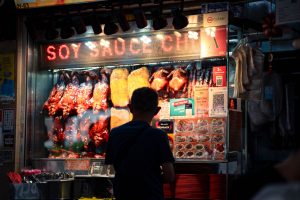For most of my life, I’ve surrounded myself with friends who firmly believe in pursuing passion, except for one. Let’s call him Dan.
Outside of work, he comes from a middle class family, holds relatively mainstream Singaporean views, and has a decent but average education. His interests are just as unexceptional: video game playing, going drinking with friends, and the occasional holiday abroad.
About three years ago, Dan gave up his passion for hospitality to join a bank. His reason was simple: the latter paid a lot more.
When I asked if he ever had any regrets, he said there were none. Having the money to enjoy the finer things in life that he previously couldn’t, he’s more satisfied with his life now.
Many people wouldn’t think much of his ordinary life. In fact, they might wonder if he seeks a deeper purpose beyond making money. Yet he is one of the few people I respect precisely for how sure he is about his decisions, even if they make him a completely typical Singaporean—the sort we might hastily label a ‘CBD drone’.
In a society where we’re constantly bombarded with messages to aspire towards a dizzying, dazzling, and extraordinary life, Dan reminds me that there is nothing shameful about embracing an average one.

As far back as my polytechnic graduation ceremony, I was made to believe that if life is not exceptional, it is not worth living. Being on the precipice of the ‘defining’ decade that is our 20s, we are encouraged to carpe diem and live, love, laugh.
In order to be wildly different, we must pursue passion at all costs. Instead of settling for a standard 9-to-5 job, we must be brave and go against the grain. This, we’re told by valedictorians and society, is the only way to leave our mark.
A popular quote from Jack Kerouac illustrates this idealism: “The only people for me are the mad ones, the ones who are mad to live, mad to talk, mad to be saved, desirous of everything at the same time, the ones who never yawn or say a commonplace thing, but burn, burn, burn like fabulous yellow roman candles exploding like spiders across the stars.”
Unfortunately, being told we’re special (or that we should be) is one hell of a burden. It shapes the presumption that a mundane life is something to be ashamed of.
Yet the truth is that only a measly fraction of us will leave a legacy remembered by more than just a handful of our family and friends. We are more likely to get crushed by a vending machine than to change the world.
So why do we scoff at the quintessential Singaporean who aspires to apply for a BTO flat by 26, get married by 28, and have children by 30?
Instead of seeing this as a legitimate life to aspire to, we dismiss them as CBD drones, whose career goals are to scale the next rung in their corporate ladder and earn a decent salary that allows them to indulge in travel, shopping, and good food.
In the eyes of those who mercilessly strive to be entrepreneurs, fitness gurus, philanthropists, outstanding parent, and social media celebrity all at once, settling for this Singaporean dream means opting for a life of mediocrity. It is selling out in its truest form.
Statistically speaking, however, most people are average, normal AF, and nothing special. Most people will settle—not because they’ve given up, but because such ambitions are perfectly fine and should be celebrated.

Similarly, it’s unrealistic to always “go big or go home”. Constantly “pursuing passion” and aspiring towards an “extraordinary life” can be tiring, especially if we do so because of some chip on our shoulder that we’ve inherited from social pressure.
Just because we hustle, compete, and strive for more, our lives are not better than others who choose to accept their place in the middle.
People who lead mediocre lives make peace with a slow, simple life. Many of them don’t have (or have never had) a passion that they’re single-mindedly driven by. They are easily satisfied by “basic” pleasures: coffee from Starbucks, clothes from H&M, and music from Top 40 charts.
Their days are also made up of mundane experiences like reading a book, riding the MRT to meet a friend, or saving money for a home.
In the long run, normal and everyday occurrences matter more than writing a bestselling novel or being the next Steve Jobs.
Take our economy for instance. It’s always been average Singaporeans who make it work. These are the administrative assistants, HR executives, general managers, and office clerks, seemingly middling jobs that some may disregard, but without whom many other jobs would cease to function. These people are satisfied with clocking in and out of work without seeking a greater purpose from their careers.
To them, a job does not need to be motivated by some universe-altering vision. It is merely a means to put food on the table. If they can afford the finer things in life, such as a car and a condominium, that’s just the icing on the cake.
Make no mistake, they have not “settled” for a typical life that revolves around earning enough money to have weekend brunches with friends, raise a family, and send their children to good schools. They want this.
The fact that some people choose this life may be perplexing for others who dream of one less ordinary, but there are few things more respectable and enviable than possessing such clarity and confidence in one’s life goals.
Screw extraordinary living, this is the life we should extol.

People who choose a normal life have nothing to prove to anyone. They live according to their own standards and expectations, considered average by society’s measurements.
To liberate themselves from the narrative about the necessity of passion and living an extraordinary life, they know the importance of being happy with all their decisions and creating meaning on their own terms.
Last year, I turned down the potential of an ‘extraordinary life’ when I rejected a couple of overseas job offers to stay in Singapore. Pursuing my passion abroad had always been a goal, so this felt like self-betrayal. In hindsight, I understood that I chose to stay because leaving didn’t feel ‘right’ for now.
Today, I know that once we can truly own our decisions, the idea of “selling out” ceases to exist.






